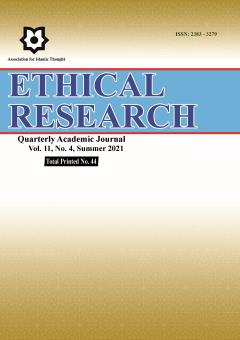Moral approach to compensating for the spiritual damage caused by the decline of reason in jurisprudence and Iranian law
Subject Areas : چالشهای اخلاقیMohammad Ferdosi Pour 1 , MOhammadReza Kazemi GolVerdi 2 * , Hossein Ahmary 3
1 -
2 -
3 -
Keywords: Spiritual damage, dementia, blood money, compensation.,
Abstract :
The development of moral principles has been one of the necessities of human society throughout history. Also, the most important point that should be addressed in the discussion of compensation for spiritual damage is the definition of moral damages. Jurists and jurists have tried to provide a logical definition of spiritual damage. Damage is not limited to financial losses, but spiritual damage damages and damages the most important dimension of human personality, which is its spiritual and spiritual dimension. However, in jurisprudence, compensation for material damages in both positive and negative types has been strongly and frequently considered and revised in Iranian jurisprudence and criminal law. However, the issue of "spiritual damage" still has much to do with the current laws and even jurisprudence. This article seeks to pay attention to the importance of reason in Islamic penal laws and criminal procedure and the methods of compensation for damages due to its loss or decline, using a descriptive-analytical method and considering jurisprudential and legal sources. Finally, with the aim of removing ambiguity from Qunin and emphasizing the spiritual rights of reason and by examining and analyzing the legitimacy of "spiritual damage" and how to compensate it by studying the current laws, especially the new criminal procedure and Islamic Penal Code, as well as civil liability and Its application to the rules of jurisprudence, such as the rule of no harm, the denial of hardship, pride and waste, as well as the examination of the rule of reason, we will conclude that spiritual damage can be claimed.
Del Vaccio, Giorgio, (2007), The Philosophy of Law, Translated by Javad Vahedi, Tehran, Maysan Publishing, P. 51.
Zubidi, Morteza, (1993), Taj al-Erus, Volume 15, Beirut, Dar al-Fakir Publishing, P. 342.
Sharbini, Mohammed bin Ahmad, (2014), The Al-Qaeda in the Settlement of the Brave Abyssal Word, Volume 2, Beirut, Al-Nashr and al-Tawizi, P. 167.
Klein, Mohammad ibn Ya'qoub, (2006). Al-Kafi, edited by Akbar Ghaffari, Vol. 4, Tehran, Dar al-Qatib Al-Islamiyah Publication, P. 292.
Al-Husseini al-Maraghi, Mir Abdel Fattah, (1996). Al-Anawin al-Faqiyyah, Volume 1, Qom, Al-Nusra Al-Islami Institute of Al-Mutlaqa al-Madrassin Baqm al-Mashrajah,P. 310.
Sheikh Tusi, Ja'far bin Mohammad bin Hassan, (1945). See Tazib al-Ahkam, Volume 10, Tehran, Dar al-Kutb al-Salamiyeh, P. 252.
Ben Zohreh, Hamza bin Ali, (1945). Richness of the Principles of Science and Law, Qom, Imam al-Sadiq Institute, p. 416.
Shahid Avalm, Muhammad ibn Maki, (2003). Al-Qa'idah, Qom, Al-Mufid Publication, Volume 1, P. 9-20.
Mohagheq Hali, Ja'far bin Hassan, (1988). Shariah al-Islam, Volume 4, Qom, Bina Publishing, p. 255.
Najafi, Mohammad Hassan, (2009). Jewelery, Volume 43, Qom, Publication of Al-Arabi Revival, p. 291.
Ibn Hamzah, Muhammad bin Ali, (1987). Al-Wasilah, Qom, Ayatollah al-Marashi al-Najafi's Compendium, P. 443.
Moqadas Ardebili, Ahmad bin Mohammed, (2000). Assembly of Al-Fadeh and Al-Burhan, Volume 14, Qom, Al-Nusra Al-Islamiyah Publication, p. 426.
Ibn Idris, Muhammad bin Ahmad. (1990), Al-Sarraer, Volume 3, Qom, Al-Nusra al-Islamiyah Publication, P.396.
Ibn Babuyyeh, Muhammad bin Ali. (1985), I leyzareh al-faqiyyah, Volume 4, Beirut, Dar al-Zawawi Publishing, P. 131.
Georgian, Abolghasem. (2002), Diatheod and Ta'zir and Qisas, Tehran, Tehran University Press, P. 148.
Sheikh Tusi, Mohammadbin Hassan. (1985). Extended: In al-Amiyah Jurisprudence, Iraq, Al-Murtazawiya School Publishing, Volume 7, P. 126.
Sivi, Gamaldim Moqadd. (2016). The Rules of Al-Aqam: In Tarih al-Halal and al-Haram, Qom, Al-Jama'ah al-Mursin Baqm al-Shorfa, al-Nusra al-Islami Institute. Volume 3, P. 684
Karzhan, Mohammad Hussein. (2015). The Most Complete Collection of Islamic Penal Code, Tehran, Modern Road Publishing, Volume 3, P. 504-503.
Horamali, Mohammad bin Hassan, (1985). Al-Shi'a Tools for the Study of Al-Sharia Issues, Volume 19, Qom, Al-Bayt Institute Lahia-ul-Thrash Publication, p. 281.
Motahhari, Ahmad (1994). Documentation by al-Wasilah by Ayatollah Khomeini, Qom, Ahmad Motahhari Publication, Volume 4, P. 229.
Sheikh Horamali, Mohammad bin Hassan (1995). Detailed Al-Shi'a Tools to Study Al-Sharia Issues, Qom, Al-Bayt Institute of Lahia Publishing, Volume 29, P. 367.
Shahid Sani, Zainuddin bin Ali. (1993). Masalak al-Islam, Qom, Al-Islami Encyclopedia Publication, Volume 15, P. 446.
Khomeini, Ruhollah. (2014). Tahrir al-Wasilah, Tehran, Publishing Institute of Imam Khomeini's Works, Volume 2, P. 588.
Zeraat, Abbas. (2016). A brief description of the Islamic Penal Code. Tehran, Phoenix Publication, Volume 1, P. 202.
Allameh Halley. (1993). The Rules of Al-Ahkam, Qom, Islamic Publication of the Teachers' Society, Volume 1, P. 612.
Khoi, Abulqasim. (2002). The Supplementary Principles of al-Menahaj gesture. Iraq, Baghdad Publishing, Volume 2, P. 374.

